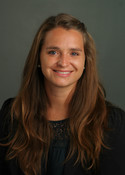Meredith Sommars, PhD, MPH

Graduation Year: 2019
Advisor: Barish
Current Position: Assistant Professor of Biological and Health Sciences, Wheaton College
Meredith Sommars grew up in Wheaton, IL, a suburb about 45 minutes west of Chicago. She went to Duke University for her undergraduate degree before returning to Chicago for graduate school in 2013. She completed her PhD work in the lab of Dr. Grant Barish along with a master’s in public health at Northwestern. She is now an Assistant Professor of Biological and Health Sciences at Wheaton College.
What made you want to go to graduate school?
The summer after my freshmen year at Duke, I stayed on campus to work in the lab of Dr. Greg Crawford. This experience exposed me to the excitement of scientific discovery and exploration in an entirely new way. I continued to work in his lab until graduation and through this experience decided I wanted to pursue a graduate degree.
What brought you to Northwestern and the IGP/DGP?
During my time at Duke, I also became very interested in global public health. As such, I was interested in earning both a PhD in molecular biology and an MPH. Northwestern was one of the few programs in the country that offered such a dual-degree program. I was excited about getting to work on my PhD while also getting training in public health simultaneously.
What did you study in graduate school?
I studied the transcriptional regulation of hepatic lipid and glucose metabolism. More specifically, I studied a transcription factor called BCL6 in mouse liver and its role in regulating lipid and glucose metabolic genes. I used a combination of genomic, metabolic, and molecular techniques in my studies.
What did you study in your postdoc?
I studied the role of BCL6 in regulating sex-specific gene programs in the liver.
What are your current research and/or teaching interests? How have they changed over time?
Broadly, I am still interested in understanding the dynamic regulation of gene expression. I have ongoing projects focused on gene regulation in liver cells as well as pancreatic alpha cells. I am interested in involving undergraduates in my research and helping them develop research projects that relate to my area of expertise but also incorporate research interests they have.
How did Northwestern prepare you for your current career?
A few experiences at Northwestern stick out as having helped prepare me for my current career. First of all, the Cell and Molecular Basis of Disease training grant fostered this interest in science communication through training us to be able to prepare a short “chalk-talk” of our dissertation research. I greatly enjoyed getting to convey my research this way without the aid of slides. I have my students give chalk talks in class because of how much I benefited from this exercise in graduate school. Secondly, I had the opportunity to attend several conferences and workshops during graduate school that gave me further opportunity to practice the skill of science communication. Third, my time at Northwestern had several built-in mentorship opportunities in which I was able to mentor younger graduate students and undergrads. This experience helped me realize how much I enjoyed coming alongside others with similar academic interests, but who are behind me in their academic journey. Mentorship remains one of my favorite aspects of teaching! I also had a great mentor in Dr. Grant Barish who serves as inspiration in my current role. Fourth, I greatly enjoyed taking classes as part of the dual-degree MPH-PhD program. These classes included a mix of medical students, practicing physicians, businesspeople, and others. I enjoyed the interdisciplinary nature of these courses, which positioned me well to teach at a liberal arts institution.
What is the most rewarding part of your job?
The most rewarding part is getting to interact with undergraduates who are just starting out in their scientific training. I enjoy seeing them curious and helping them think through career next steps.
What is the most challenging part of your job?
The most challenging part is juggling all the different responsibilities associated with my job. It can be difficult to manage my time between teaching, conducting research, serving on committees, and still having a balanced life at home too. I wear a lot of “hats” in this role, which can be difficult to switch between.
What advice would you give to current students interested in pursuing careers in academics?
I would advise students to be open to different avenues in academic careers. My entire time in graduate school I assumed I would pursue a research-only career path. I sort of fell into my current role which is more heavily focused on teaching. I wish that I had taken advantage of other training opportunities in graduate school that could have exposed me to teaching earlier. Perhaps then I would have found my passion for teaching sooner. We often leave graduate school feeling like there are two paths – academia or industry. I’ve learned that even in the academy, there are a variety of paths that one may choose that still leverage PhD training.